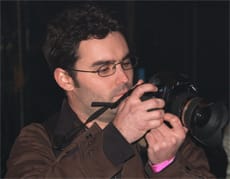Since the “Nice” edition of Métro has existed, Michel Bernouin can be seen everywhere news is happening in Nice. Armed with his notebook and camera, he is the perfect prototype of a field journalist. Michel Bernouin defines what a journalist is to Nice-Première.
Nice-Première: Who is Michel Bernouin?
Michel Bernouin: The journalist who covers Nice news for the daily newspaper Metro.
NP: How did you become a journalist?
MB: I couldn’t really say. Certainly not by obtaining a degree or signing a work contract! Personally, I spent a good part of my university holidays doing internships and fill-ins. I think that gradually you soak up the profession and over time develop your own way of practicing it.
NP: What does a day in the life of Michel Bernouin look like?
MB: Anything but another ordinary day! It’s always the news that decides my schedule. And when an unexpected event occurs, like the recent avalanche at Auron that took the life of a high mountain gendarme, I drop whatever I was doing and rush out.
The only “routine” is in the morning: I start my days by checking my emails, my calendar, the news wire and news websites. After that, I determine which news will be featured on the Nice page of tomorrow’s Metro. And then I head out for my first report.
NP: What does being a journalist mean to you?
MB: Generally, I’d say it means listening, questioning, and trying to have as much perspective on the news as possible. But there are many ways to practice journalism. In my case, I do “daily” and “local” news. This implies spending time on the ground, meeting a lot of people, being quick and somewhat resourceful.
NP: What is your opinion on Azuréan media?
MB: I sometimes regret the inertia caused by the presence of a “heavyweight” in the history. Like others, I sometimes feel confronted with a two-speed communication at some institutions. But little by little, things are evolving.
NP: What challenges do you most often encounter during your reports?
MB: Lack of time! When you have to write three articles and ten short news pieces each day, it’s unfortunately not possible to devote a whole day to a single report.
NP: What advice would you give to a young girl or boy who wants to become a journalist?
MB: Find one or two internships to discover the reality of the profession, which is sometimes quite far from the image one might have of it. It’s a beautiful profession, but one that requires some sacrifices. Then, if he or she really wants to dive in, they should do more internships, to gain experience. Studies are a necessary step, but even the most prestigious ones can never replace experience.


